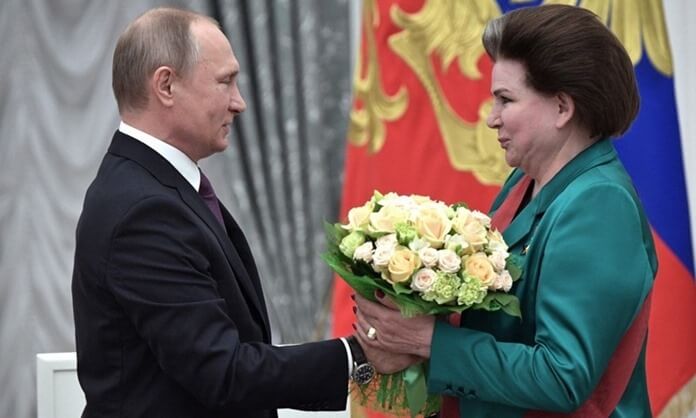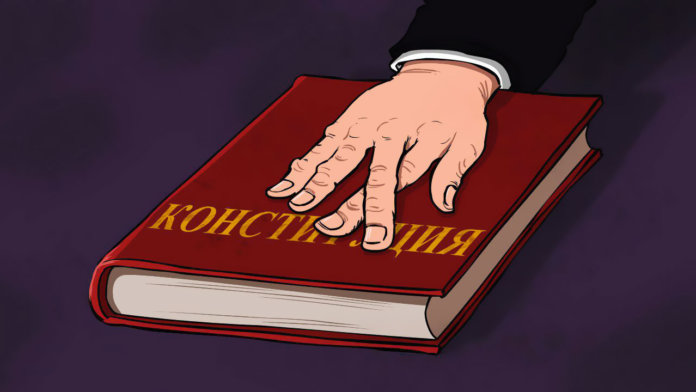While ordinary Russians watch the ruble with trepidation, life is in full swing on the state sidelines. Many times the deputies are discussing the upcoming amendments to the Constitution. And as a result of their hard work, the volume of edits almost doubled. What exactly do statesmen and wives want to change and how will this affect you and me?
We present to you the top 10 most important amendments to the Constitution of the Russian Federation proposed in 2020.
10. For all good and against all bad
Let's start with the simpler one. A number of amendments to the 2020 Constitution (Articles 67 and 79) are dedicated to the fact that the state will act as the guarantor of the protection of traditional values, declare itself the successor of the USSR, promise to preserve the memory of ancestors and create all conditions for the development of children - from spiritual to physical.
- According to some political analysts, with the words of spirituality, the government is trying to breathe energy into the masses. Say, having read about the special path of Russia, the people will immediately mobilize and run to vote.
- The first version of the amendments did not inspire the Russians, either because it was not clear to them exactly how the redistribution of powers of the highest echelons of state power would affect their lives, or it was boring to read legal documents.
- According to opinion polls, the number of those who were going to vote for amendments in just a month fell from 72% to 25%. It was necessary to somehow urgently correct the situation.
So the government is trying to please everyone: and believers (by inserting faith in God into the text of the edits), and lovers of crunching a French bun (making a reference to the Russian Empire). And nostalgic about the Soviet empire (declaring the Russian Federation the heir to the USSR), and patriots of the Great Patriotic War (adding mention of Victory Day). And also ordinary family Russians who are preoccupied with how to feed, dress, shoe and raise children.
Let's add that this vinaigrette of values reflects the complexity of the state identity of the Russian Federation. USSR and Russian Empire. Believers and atheists. Elderly people and young people. Personal freedoms and traditional values. It's not so easy to combine it all!
9. State language
One of the amendments to the 68th article of the Constitution concerns the language in which we speak. Do not be afraid - the government does not at all call on the citizens of the Russian Federation to massively switch to Klingon. Russian has been and remains the state language. True, it is interesting that the native speaker of this language was not named by name. In the text of the amendment, only a certain "state-forming people" appears.
At the same time, the state reserves for the republics that are part of Russia the right to choose their own state language and teach it in schools, as well as draw up documents in this language.
8. Cultural identity
Taking a course towards spirituality and protection of cultural values, the initiators of the amendment to the 2020 Constitution are not going to be limited to one “state-forming people”.On the contrary, it is argued that any, even the smallest people, will receive a guarantee of the preservation of their cultural and linguistic heritage. True, it is not yet known by what state mechanisms the government is going to achieve this.
The third point of amendments to Article 69 is also interesting: fellow citizens who intend to preserve their cultural identity while living abroad will not be left without state support.
7. Cell of society
In contrast to the pernicious influences of the depraved West, where same-sex marriage has become fashionable, the Russian Constitution appears to be a bulwark of tradition. In article 72, where until now there was a list of objects under the joint jurisdiction of the Russian Federation as a whole and the republics in particular (for example, nature reserves, historical and cultural monuments, etc.), one more paragraph was added on the protection of the family.
Only the union of a man and a woman is called marriage.... The state promises to protect the family, motherhood and fatherhood, as well as provide all conditions for the "decent upbringing" of children in the family.
6. Foreigners do not order us
Although the Russian Federation can participate in interstate organizations, however international law - if they contradict the Russian Constitution, it is not going to take it to heart.
This is evidenced by the change in Article 79, which is mostly devoted to the sovereignty of Russia and the inadmissibility of interference by foreign "well-wishers" in its internal affairs.
5. We will not give up an inch
One of the changes to the Constitution of the Russian Federation concerns Article 67. It is proposed to supplement it with the statement that the Russian Federation has defended and will defend its sovereignty and its territories. And that any actions aimed at violating the first and transferring the second, or even calls for such, will not be allowed.
Many political scientists see here a subtle allusion to the Crimea, as well as to hotbeds of territorial conflicts between Russia and other powers (for example, the Kuril Islands). Whether this is really so, we will see on March 18. According to unofficial information, it is on this day that the president can sign the law on amendments. And it was on this day that the “official” annexation of Crimea took place six years ago.
4. Not a servant of two masters
The Bible also says that it is impossible to serve two masters. The creators of the updated Constitution, apparently, took this statement to heart.
- Now only a Russian citizen over 30 years old can be a president and an important state official, who - attention! - permanently resides in the Russian Federation.
- He should not have a foreign citizenship, even a dual one, in his entire life. An exception is if he lived in the territories that later became part of the Russian Federation. Looks tough? It's only the beginning.
- This hypothetical person still cannot have money and other valuables in storage in banks that are located outside of Russia.
The requirements for government officials could become even more stringent if federal laws come into play.
Changes in Articles 77, 78, 95, 97, 110 and so on are devoted to the moral and material appearance of officials. True, according to sources close to the deputies working on the constitution, the request to ban the possession of valuables abroad was rejected by a majority vote.
3. Redistribution of power
It was these revisions that served as the basis for the reform presented in January by Vladimir Vladimirovich Putin. We are talking about changing the constitutional powers of the highest state bodies.
If you work your way through the legal language, it becomes clear that the State Duma and the Federation Council will be able to influence the formation of the government and structural appointments, and the governors will acquire new powers. This is the subject of Article 83 of the Constitution of the Russian Federation.
2. The highest state person
 One of the most important proposed changes to the Russian Constitution is related to the question of who can become president of the Russian Federation and how long he can remain in this post.According to Article 81, the term of the presidency will be six years, and there can be no more than two terms.
One of the most important proposed changes to the Russian Constitution is related to the question of who can become president of the Russian Federation and how long he can remain in this post.According to Article 81, the term of the presidency will be six years, and there can be no more than two terms.
It seems that Valentina Tereshkova's proposal to "reset" the statistics of presidential terms has met with stormy approval from the deputies. The term limitation clause will not have retrospective force - that is, it does not take into account the presidential terms that were before the introduction of this amendment to the Constitution.
Roughly speaking, all terms V.V. Putin after the adoption of the amendments will be reset, and he can occupy the most important chair of the country for many, many years. At least 12 years old.
1. Course towards sociality
And here are, perhaps, the most interesting for ordinary Russians, the amendments to the Constitution, proposed in 2020.
- It is proposed to add in Article 75 that the state respects the work of citizens and wants to protect their rights by introducing the link “minimum wage” equals “subsistence minimum”.
- The second important change is the regular (at least once a year) indexation of social benefits and payments, including pensions.
- And the amendments to Articles 72 and 132 promise to improve the quality of medical care throughout Russia, including its most remote corners. And it's not just about accessibility, but also about the quality of medical services.
It is not surprising that these particular amendments (as well as amendments on sovereignty, inalienability of territories and the prohibition of foreign citizenship for civil servants) aroused the greatest public interest.
Work on the list of amendments to the Constitution is still ongoing. According to the speaker of the State Duma, about 200 amendments have been made so far, and 177 will go to the political basket. Perhaps the process of working on the country's main document will also be influenced by recent events on the financial front. After all, collapse of the ruble and higher prices for goods directly affect the well-being of citizens, and a disgruntled and angry citizen is not inclined to make decisions that are convenient for the authorities.
Voting Day for Amendments to the Constitution - Day Off or Not?
On April 22, 2020, a nationwide vote will be held on amendments to the Constitution, enshrined in the federal law with the long title "On improving the regulation of certain issues of the organization and functioning of public authorities."
Wednesday 22 April 2020 declared a non-working day... For this day, wages to working citizens will be calculated in accordance with the provisions established by the Labor Code of the Russian Federation, which apply to wages on non-working (holidays) days. In short, the payment for that day will be doubled.
It is interesting that traditionally all popular voting in Russia takes place on Sunday. There is even an assumption that the government has timed the voting to coincide with the 150th anniversary of the birth of Vladimir Ilyich Ulyanov (Lenin), who was born on April 22, 1870. However, the authorities argue that such a coincidence is pure coincidence. And the choice of the voting day for the amendments to the Constitution is explained by the favorable location of April 22 - between Easter and the beginning of Ramadan.

